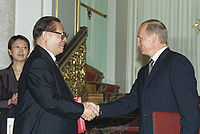Treaty_of_Good-Neighborliness_and_Friendly_Cooperation_Between_the_People's_Republic_of_China_and_the_Russian_Federation
2001 Sino-Russian Treaty of Friendship
2001 treaty between China and Russia
The Treaty of Good-Neighborliness and Friendly Cooperation Between the People's Republic of China and the Russian Federation (FCT) is a twenty-year strategic treaty that was signed by Jiang Zemin of China and Vladimir Putin of Russia, on July 16, 2001.
This article includes a list of general references, but it lacks sufficient corresponding inline citations. (August 2010) |
| 2001 Sino-Russian Treaty of Friendship | |||||||||||||
|---|---|---|---|---|---|---|---|---|---|---|---|---|---|
 Jiang Zemin and Vladimir Putin after signing the FCT | |||||||||||||
| Chinese name | |||||||||||||
| Simplified Chinese | 中俄睦邻友好合作条约 | ||||||||||||
| Traditional Chinese | 中俄睦鄰友好合作條約 | ||||||||||||
| |||||||||||||
| Russian name | |||||||||||||
| Russian | Договор о Добрососедстве Дружбе и Сотрудничестве Между Российской Федерацией и Китайской Народной Республикой | ||||||||||||
On June 28, 2021, Russia and China extended the treaty for another 5 years after its expiration in February 2022.[1][2]
The treaty outlines the broad strokes which are to serve as a basis for peaceful relations, economic cooperation, as well as diplomatic and geopolitical reliance. Article 9 of the treaty states "When a situation arises in which one of the contracting parties deems that peace is being threatened and undermined or its security interests are involved or when it is confronted with the threat of aggression, the contracting parties shall immediately hold contacts and consultations in order to eliminate such threats."[3] Other articles (A7 and A16) point at increasing military cooperation, including the sharing of "military know-how" (A16), namely, Chinese access to Russian military technology.
The treaty also encompasses a mutual, cooperative approach to environmental technology regulations and energy conservation; and toward international finance and trade. The document affirms Russia's stand on Taiwan as "an inalienable part of China" (A5), and highlights the commitment to ensure the "national unity and territorial integrity" in the two countries (A4). The treaty includes a no first use clause for the two nations against each other.
According to Paul Stronski and Nicole Ng of the Carnegie Endowment for International Peace, "the greatest threat to the West of the Sino-Russian partnership emanates from their efforts to adjust the international system to their advantage".[4]
This section needs additional citations for verification. (July 2020) |
This article possibly contains original research. (July 2020) |
Analysts have attributed the motives behind, and perceived mutual benefit of, the FCT to several factors.[5]
China
- China wishes to develop and modernize its armed forces, much of which remain outdated.[needs update] This process can be accelerated with Russian military training and technology.
- China wants to obtain a stable, consistent and affordable level of fuel shipments, especially petroleum. This goal can be better met with purchases and delivery of Russian oil, including the construction of an Eastern Siberia–Pacific Ocean oil pipeline.[6]
- China wishes to attain support for its stance towards Taiwan.[citation needed]
Russia
- Russia strives to obtain sources of capital, which it is in need of following severe losses to international speculators during the process of Soviet dissolution[needs update]. This effort can be significantly aided through the use of Chinese capital. Accordingly:
- Russia wants to find sources of employment for its skilled workforce.
- Russia wants to sell its military technology and expertise.
- Russia wants to sell its large reserves of petroleum and natural gas.
- Russia receives an assurance that the expansion of Chinese economic influence in the post-Soviet space does not oppose Russian political influence.[4]
Economic competition with the US, Japan and the EU
The United States, Japan and the European Union are three economic powers who possess a skilled workforce and access to capital. Russia and the PRC can more effectively compete against these powers in the world economy, with Russia given access to Chinese capital and China given access to Russian training and technology.
- Russia, China extend friendship and cooperation treaty -Kremlin reuters.com, 2021-06-28
- "Treaty of Good-Neighborliness and Friendly Cooperation Between the People's Republic of China and the Russian Federation". www.fmprc.gov.cn. Archived from the original on 5 June 2011. Retrieved 19 April 2022.
- Stronski, Paul; Ng, Nicole (2018-02-28). "Cooperation and Competition: Russia and China in Central Asia, the Russian Far East, and the Arctic". Carnegie Endowment for International Peace. Archived from the original on 2018-03-01. Retrieved 2021-07-26.
- "Insight on the News: China and Russia Align Against U.S - sign Sino-Russian Friendship Treaty; United States". Archived from the original on 2006-05-13. Retrieved 2006-03-15.
- Text of the Treaty — Ministry of Foreign Affairs of the People's Republic of China